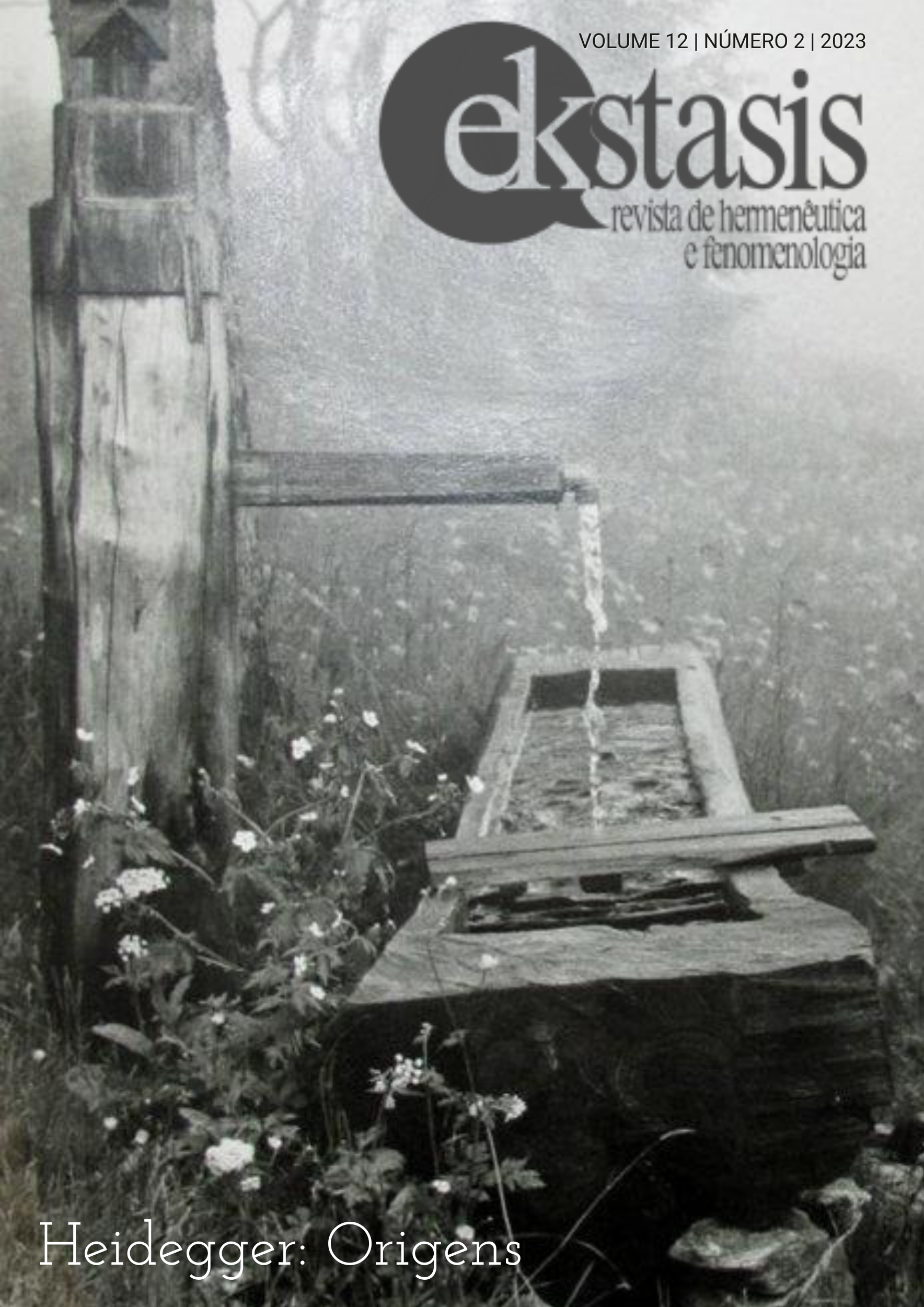A recepção de “Faktum” na Habilitationsschrift de Heidegger e a influência neokantiana no projeto da tese
DOI:
https://doi.org/10.12957/ek.2023.79246Resumo
O artigo se ocupa de alguns contextos da filosofia do jovem Heidegger, mais precisamente de seu escrito de habilitação à docência (Habilitationsschrift), intitulado: A doutrina das categorias e do significado em Duns Scotus. Em foco está o conceito de Faktum, termo na gênese da futura analítica existencial de Heidegger; também é observada a influência neokantiana que o jovem filósofo recebera de autores como Heinrich Rickert e Emil Lask. Com o objetivo principal de caracterizar a recepção do referido conceito no seio de uma tradição kantiana, o escrito prevê dois movimentos: No primeiro momento temos a indicação do quanto, no período em que escreve sua tese de habilitação, Heidegger se vê inspirado pelas pesquisas lógicas de Rickert. Também nesse ponto, apontaremos, após caracterização da leitura que Lask faz da doutrina da significação de Duns Scotus, o quanto a filosofia do Faktum em Heidegger tem a se beneficiar com esses estabelecimentos. Num segundo momento, todo o esforço está em marcar o quanto um conceito de Faktum, na chave de um fato histórico (historische Faktum), não aponta a uma fatualidade empírica, mas ao dar-se da própria vivência no que ela tem de mais originante. A função dessa “dação” (Es-gibt) pretende ser aí determinada.
Downloads
Referências
CAZZANELLI, Stefano. Conocimiento y donación entre Rickert y Heidegger. Con-textos Kantianos, Madrid, n. 9, p. 252-273, jun. 2019.
CAZZANELLI, Stefano. El neokantismo en el joven Heidegger. Revista de Filosofía. Madrid, v. 35, n. 1, p. 21-43. 2010.
ESCUDERO, Jesús Adrián. El joven Heidegger: un estudio interpretativo de su obra temprana al hilo de la pregunta por el ser. 2000. Tese (Doctorado en Filosofía) – Facultad de letras, Universidad Autónoma de Barcelona, Barcelona, 2000. 543p.
FERRER, Rocío Garcés. El desasosiego de la vida fáctica. La transformación afectiva de la intencionalidad en las lecciones de Friburgo de Martin Heidegger (1919-1923). 2014. Tese (Doctorado en Filosofía) – Facultad de Filosofía y Ciencias de la Educación, Universidad de València. Valencia, 2014. 417p.
FILIPPOPOULOS, Georgios. El trascendentalismo de la facticidad en Ser y Tiempo de Martin Heidegger. 2015. Tese (Doctorado en Filosofía) – Facultad de Filosofía, Departamento de Filosofía Teorética, Universidad Complutense. Madrid, 2015. 338p.
HEIDEGGER, Martin. Der Idee der Philosophie und das Weltanschauungsproblem - Kriegsnotsemester. In: Gesamtausgabe – II Abteilung: Vorlesungen, Zur Bestimmung der Philosophie. Band 56-57. Frankfurt am Main: Klostermann, 1999.
HEIDEGGER, Martin. Die Kategorien- und Bedeutungslehre des Duns Scotus (1915). In: Gesamtausgabe – Frühe Schriften – I Abteilung: Veröffentlichte Schriften 1917-1970. Band 1. Frankfurt am Main: Klostermann, 1978.
HEIDEGGER, Martin. Grundprobleme der Phänomenologie (1919-20). In: Gesamtausgabe – II Abteilung: Vorlesungen 1919-1944. Band 58. Frankfurt am Main: Klostermann, 1993.
HEIDEGGER, Martin. “Alma mía!” Cartas de Martin Heidegger a su mujer Elfride 1915-1970. Buenos Aires: Manantial, 2008.
HEIDEGGER, Martin; RICKERT, Heinrich. Carteggio (1912-1933) e altri documenti. Trad. Anna Donise e Anna Pia Ruoppo. Napoli, Salerno: Orthotes, 2016.
KAHLMEYER-MERTENS, Roberto Saraiva. Indicação de “nosso ser-aí mais próprio”, tarefa de Ontologia: Hermenêutica da Facticidade. In: Perspectiva Filosófica (2023), v. 50, n. 2, p. 90-105.
KISIEL, Theodore. The Genesis of Heidegger’s Being and Time. Berkeley; Los Angeles: University of California Press, 1995.
KISIEL, Theodore; SHEEHAN, Thomas. Becoming Heidegger: On the trail of his early occasional writings, 1910-1927. Evanston: Northwestern University Press, 2007. 534p.
MAC DOWELL, João A. A gênese da ontologia fundamental de Martin Heidegger: ensaio de caracterização do modo de pensar de Sein und Zeit. São Paulo: Loyola, 1993. 206p.
RESENDE, José. Em busca de uma teoria do sentido: Windelband, Rickert, Husserl, Lask e Heidegger. São Paulo: EDUC; FAPESP, 2013.
VOLPI, Franco (coord.). Guida a Heidegger. 2. ed. Urbino: Laterza, 2005.


